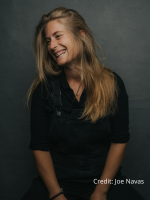Chris Trump grew up on a 750-acre family macadamia nut farm in Hawaii. His dad took over the farm in 1988, and by the time Chris joined the business in the early 2000s, it was struggling. Profits were low, and chemical use was high.
"We needed a better way to farm. And we wanted to be organic, we saw that was the direction the consumer was going. And we started doing trials," he said.
Chris had heard about an organic farming method called Korean Natural Farming. It was supposed to be low cost and dramatically improve soil health and disease resistance — all without pesticides or chemical sprays. Instead, KNF farmers make their own inputs by fermenting and reproducing indigenous soil micro-organisms using common, inexpensive ingredients like rice and sugar. Chris signed up for a class with Korean teacher Master Cho Han-Kyu and applied what he learned to a tiny trial plot of 14 trees.
"So the 14-tree trial was a mix of trees, most of them healthy," Chris explained. "But we had two or three that were sick. We have a disease in macadamia nuts called macadamia nut quick decline, macadamia slow decline. It's a root borne fungal disease called phytophthora. And we typically will push those trees over eventually. They have a guaranteed journey towards death."
The disease involves a parasitic relationship between fungi and tree roots, and usually defoliates the trees, which then slowly die. But Korean Natural Farming is all about creating different fermented brews to rehabilitate fungal and bacterial relationships depending on what the soil and the plants need. So, Chris decided that instead of just pushing down these trees in the trial plot, he’d give a targeted KNF fungal treatment a try.
"Our quick decline trees, our slow decline trees were re-foliated in one year after single application of this inoculum as fungal inoculum. And I was like, that's kind of incredible, we gotta to see if we can duplicate those results, but kinda scale up a little bit. So I tried five acres."
Along the way, he had some hiccups. He thought he could buy Korean Natural Farming inputs — the fermented brews of indigenous soil microorganisms. But that didn’t work — he bought 20 tons, applied some to his five-acre trial block, and within three days had turned the leaves on every single tree yellow. He looked at the inputs under a microscope and discovered that the ratios of fungi to bacteria were not at all what he’d thought — and instead of rehabilitating soil relationships, he’d accidentally made them much worse.
"That kind of was the beginning for me, where I was like, okay, I can't rely on somebody else to do this," Chris said. "I need to not only do it myself, but I need to understand it. I need to understand the principles I'm dealing with."
Chris ended up studying with another well-known Korean Natural Farming teacher and making numerous trips to study the techniques in South Korea. He began making his own inputs, helped the five acres he’d accidentally hurt recover their health, and as he gained confidence and his family saw results, they expanded the acreage they managed this way.
"So I did 50 acres and then 144 acres and we ran those trials for about four years on 144 acres and then decided to convert the crop."
Today, all 750 acres of macadamia nuts on Chris Trump’s family farm are certified organic and managed with Korean Natural Farming techniques. He estimates producing and applying KNF inputs is about half the cost of conventional organic treatments. And since studying in South Korea, Chris has become a Korean Natural Farming leader who teaches all over the world. He says the more he learns about the relationships that create soil health, the more there is to learn — and that’s what makes it interesting.








